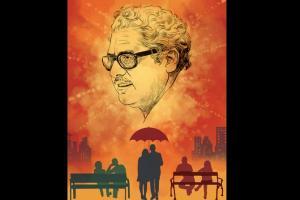Some, with surface resemblance to Chatterjee's films, start as purportedly about women, somehow end up being about Ayushmann' Khurrana's angst or sexual health

Illustration/Uday Mohite
![]() The default description of Basu Chatterjee's work is middle-of-the-road cinema implying there are two definitive sides, and while it has qualities of the two, it represents no defined qualities of its own. For the sake of cinema and politics, let's retire these reductive terminologies.
The default description of Basu Chatterjee's work is middle-of-the-road cinema implying there are two definitive sides, and while it has qualities of the two, it represents no defined qualities of its own. For the sake of cinema and politics, let's retire these reductive terminologies.
Basu Chatterjee's films reveal a distinct sensibility I would call casual cosmopolitanism. Whether set in Bombay, Delhi or a small town, characters are individuals, and the films contain numerous worlds—literature, European art-house films, Hollywood. He drew from Hindi and Bengali literature (Rajendra Yadav, Manu Bhandari, Sarathchandra, Shartindu Bandhopadhyaya) European neo-realism and Hollywood. The many communities that make Bombay —Parsis, Christians, Gujaratis, North Indians, among others, are present with enjoyment of their distinctive accents and ways. Families, neighbourhoods, small towns are settings, and do not symbolise any pan-Indian values or identities.
ADVERTISEMENT
Stories take place in offices, trains, BEST buses, cafes and dreams—places where many worlds criss-cross to create new roads. Love's alchemy— creating dilemmas and propelling atypical choices—are a central preoccupation. But choices aren't presented in epic terms to symbolise social conflict, thereby becoming prescriptive choices and moralities. Rather they are psychological journeys of interiority and help us understand why people, with all their social and individual facets, choose as they do. Amol Palekar and Vidya Sinha suddenly replace movie stars on screen in the song Janeman Janeman, because everyone is a heroine or hero in their own stories, not everyone else's.
Characters whose dogma, rigidity or prejudice oppose these journeys, are neutralised by the stubborn hearts and confused minds of those almost comically in love, and bent on following their bliss. Love does not derive importance from opposition—it is good enough in itself. As Amjad Khan, advising Anil Kapoor not to sign his love letter in Chameli Ki Shaadi puts it, "Premi ko kabhi kanoon ke chakkar mein nahin phasna chahiye." A throwaway dialogue, which suggests the roads are many—it's not the middle of the road, it's simply another route.
There is a gender confidence too. Men and women equally traverse the public and domestic space, neither space being more significant. Women's interiority and their emotional choices often drive the plot of the films. And what a range of women-people: moody, brooding Vidya Sinha, snobbish, headstrong Shabana Azmi, sincere, romantic Zarina Wahab, rambunctious Amrita Singh, sexually assertive Hema Malini. They do not carry the burden of all womankind to justify their presence. People are enough as they are.
Through the characters and their contemporaneity we inhabit a space and time of reflecting on our inner lives. This gives us confidence in the world of our emotions and personal desires, even as social issues underpin the narrative, as the inter-caste marriage of Chameli ki Shaadi.
In contrast, most films today are driven by schemas of social identities and issues to justify themselves, their goal to make us endorse the film's political position and filmmaker's progressive gesticulations. Some, with surface resemblance to Chatterjee's films, start as purportedly about women, somehow end up being about Ayushmann' Khurrana's angst or sexual health.
Chatterjee's work has cosmopolitanism's finest trait—a refusal to bore the audience. Charm, humour, delight, observational detail, music and poetry, space for our own thoughts. Cosmopolitanism's fleeting intimacies, make social commentary, baaton baaton mein, before you get off at your station, as Basu Chatterjee has now done.
Paromita Vohra is an award-winning Mumbai-based filmmaker, writer and curator working with fiction and non-fiction. Reach her at paromita.vohra@mid-day.com
Catch up on all the latest Mumbai news, crime news, current affairs, and a complete guide from food to things to do and events across Mumbai. Also download the new mid-day Android and iOS apps to get latest updates.
Mid-Day is now on Telegram. Click here to join our channel (@middayinfomedialtd) and stay updated with the latest news
 Subscribe today by clicking the link and stay updated with the latest news!" Click here!
Subscribe today by clicking the link and stay updated with the latest news!" Click here!







